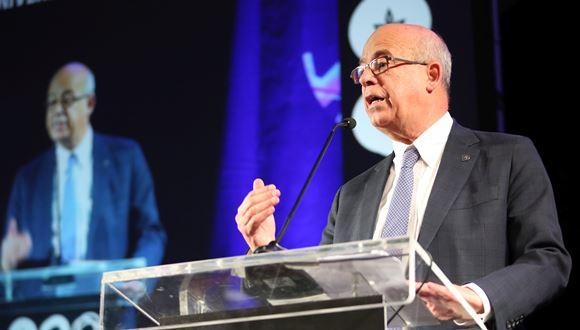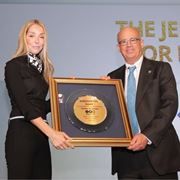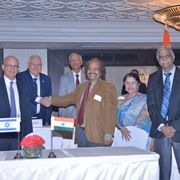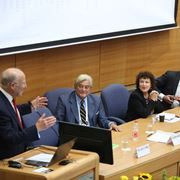BOG 2018: First Assembly Speech by TAU President Joseph Klafter
Good morning and warm greetings to everyone.
I’ve been looking forward to telling you about our exciting year, which I’ll divide into two main elements – the University’s visibility and the University’s capability. Or, in other words, how the University puts Israel’s best face forward and how the University drives big ideas onward.
I’ll start with a quote I like. It’s from an interview with Ronnie Chan, the Hong Kong businessman and Tel Aviv University honorary doctor. Chan said that his Chinese friends line up to come with him to visit Tel Aviv University. Why? Because, and I quote Chan, “The official capital of Israel is Jerusalem. But the capital of Startup Nation, in terms of entrepreneurship and creativity, is Tel Aviv. And what is the seat-of-government of Startup Nation? It’s Tel Aviv University!”
On that note, I’d like to welcome you to the capital of big ideas – the theme of the video clip we produced to promote the University’s image in the framework of our one-billion-dollar fundraising campaign.
I believe that Israel’s 70th anniversary has given every institution an excuse for festivities, or what we call in Hebrew – siba le mesiba – a reason to party! But I also believe that your choice of celebrating with Tel Aviv University has special meaning. That’s because our University, and our home city of Tel Aviv, represent the Israel we most cherish. The Israel that’s inclusive and forward-looking. The Israel that’s proud of its outsized contributions to the world in science and scholarship, technology and culture. Over the past year, especially, we’ve seen a clear change in how our institution is perceived and singled out.
I’ll give you a few examples of our enhanced visibility: Stanford University and UC Berkeley signed agreements for joint research with Tel Aviv University in smart cities and bioinformatics. This $10 million TAU-Bay Area collaboration was initiated, and is being funded, by the Koret Foundation. We inaugurated the project yesterday with Dr. Anita Friedman.
When giant chipmaker Broadcom looked for the best place to build their Israeli R&D center, they chose Tel Aviv University. Broadcom will construct a 5-story, 15,000-square-meter building next to our engineering complex. That’s about 160,000 square feet. A full third of the space will go to TAU for its own facilities. Engineering students will get hands-on industrial experience at Broadcom’s advanced labs down the hall.
The Check Point Building is another example of industry involvement with the University. Check Point’s co-founder Gil Shwed, a TAU Governor and Honorary Doctor, won the Israel Prize this year, in part for his support of our Youth University, which will receive its own wing in the new building.
The University’s appeal is extending into Asia through the successful India-Israel Forum and China-Israel Innovation Forum. As a mark of how connected the University is to the highest echelons of business and academia, Jack Ma, chief of China’s Alibaba, will be receiving a TAU honorary doctorate tonight. Ratan Tata, head of India’s largest conglomerate, got one last year. In fact, Tata Trusts recently identified the enormous potential of Indian-Israeli cooperation in the food security sphere. They chose TAU’s Public Policy team and the Boris Mints Institute as their partners for the new “Indo-Israeli Innovation Villages Program” for bringing agricultural expertise to India’s small farms. Peking University in Beijing has also asked TAU to set up a joint food security institute.
Still on the subject of how our reputation precedes us, Tel Aviv University was tapped by the City of Florence, Italy, to set up an innovation center. The Florence Municipality has given us space in a beautiful palace – in central Florence – for free – to run courses and workshops in brain studies, nano-engineering, biotechnology, entrepreneurship and more.
What I’m saying, to put it concisely, is that TAU is not just on the map, it is redrawing the map. You – our Governors and friends, our leaders and supporters – you have played a key role in this.
I noted at the beginning of my talk that I would be discussing two main developments this year. The first was boosting our visibility. The second is boosting our capability.
Today our campus has 118 buildings, not counting the dorms. We are continuing to expand the University’s physical, research and teaching capabilities, with the help of our TAU supporters. First, we have many buildings sprouting up, including the Pouran and Izak Parviz Nazarian Building, the Smolarz Family Building for Life Sciences, and the Lorry I. Lokey Graduate Center at the Coller School of Management. We’re also renovating a mainstay on campus, the Archie Sherman Building for Life Sciences, with funding from the second generation of the Sherman family. Soon we’ll be breaking ground for a new Trauma Studies building.
This year the anonymous donor for our planned Nanoscience and Nanotechnology Building announced his gift publically. It’s Roman Abramovich, owner of the Chelsea football club, and he’s donated $30 million.
We also received this year a $15 million gift from TAU Honorary Doctor Millie Phillips of Australia, to dedicate Student City. We have three more towers planned that will bring total beds there to 2,500. The complex makes housing affordable for students from Israel and abroad.
I’m pleased to announce the renewal of the campus-wide Blavatnik Initiative supported by TAU Honorary Doctor Len Blavatnik. The impact of his donation on drug development, cyber, film and computer science has been so powerful that we have a special name for it. We call it the “Len Effect.” Len’s total giving to the University has reached $45 million.
We received another vote of confidence from TAU Honorary Doctor Boaz Dotan and his wife, Varda. They’ve renewed funding for research in blood cancers that could provide hope for victims of multiple myeloma, childhood leukemia and other killers.
A new cancer fund will be launched tomorrow by the family of TAU Governor Billy Cohen, a member of the TAU Global Campaign Cabinet. Still in the field of medical research, the Prajs-Drimmer family has made a new commitment to their institute for anti-degenerative drugs.
Moving further afield – by 160 kilometers exactly, to Masada – the Porter Dead Sea Institute for Life under Extreme Conditions co-sponsored the first Dead Sea Summit with support from Deputy Chair of the TAU Board of Governors, Dame Shirley Porter, and the Porter Foundation. The idea of bringing TAU to the Dead Sea was the brainchild of Dr. Mira Marcus-Kalish. We’re so fascinated by what Mira found there, that we’ve organized a Dead Sea tour for Governors on Monday.
Recently we launched a new water institute focused on recycling wastewater. It was founded by Dr. Michael Mirilashvili of Russia and Israel, in honor of his late father, Moshe Mirilashvili. Right now, Institute researchers are testing a pilot system for treating hospital wastewater so that harmful pharmaceuticals get filtered out.
Last week Tel Aviv Mayor Ron Huldai spoke at the launch of the Cukier, Goldstein-Goren Center for Mind, Cognition and Language established by TAU Governor Selina Goren and family members. We call it the “MiLa Center” for short and it will draw on the powerful resources of our Sagol School of Neuroscience which is a brand name in Israel, thanks to Sami Sagol, Vice Chairman of the TAU Board of Governors, and Tova Sagol. Both Sagols are members of our Global Campaign Cabinet.
As I describe all these projects that are shoring up university capabilities, I can’t help but marvel at their diversity. But there’s more to it. The more labs we build, the more superb young faculty we recruit, the more research we perform – all these are leveraged for major competitive grant funding. This year research grants topped $220 million. The University also kept up its good showing in the ERC, ranking 8th among all European institutions competing for ERC funding.
At this Board meeting we’re celebrating many more wonderful initiatives:
Imagine wearable electrodes thinner than Band-Aids that could help doctors monitor your health around-the-clock. This is one invention among many being fabricated at the Chaoul Center for Nanoscale Systems.
We recently had a scientific discovery make world headlines – finding the oldest human remains outside Africa. The research was supported by the Dan David Center for Human Evolution and Biohistory Research established by TAU Governor Gabriela David and TAU Governor and Global Campaign Cabinet member Ariel David, and also by the Shmunis Family Anthropology Institute that we’re inaugurating with Vlad and Sana Shmunis.
The Genomics Research Unit provides a crucial resource for the Alfredo Federico Strauss Center for Computational Neuro-Imaging. Here was a case of an urgent need at the University and an open-hearted response.
With another project, the Yandex Machine Learning Initiative, the need came from another direction. Israel needs trained experts to lead the artificial intelligence revolution, and Arkady Volozh, who founded the Google of Russia, wants to help expand course offerings in the field at the Blavatnik School of Computer Science.
Dimitri Zimin hopes to harness Israel’s famous startup mentality to improve quality of life. The first “Request for Proposals” of the new Zimin Institute for Engineering Solutions Advancing Better Lives resulted in 5 grants for applied research in engineering, medicine and life sciences. Still in the field of technology, the Shlomo Shmeltzer Institute for Smart Transportation was established by his family to commemorate an automotive pioneer here in Israel.
Technological advances are connected to economic growth, one of the main topics of the new Jacob Frenkel and Mort Zuckerman Institute for Global Economics. Here with us to kick off the new institute are Mort’s nephews, Eric Gertler and Jamie Gertler, Governors of TAU. And of course, technological growth can’t happen without deal flow. TAU kicked off TAU Ventures, the first VC Fund at an Israeli university to provide funding to startups by students and alumni.
All these projects – and others we’ll be dedicating in the next few days – have a common purpose. They’re preparing the University to drive the next wave of Israeli innovation, and not just in technology but across the rainbow of topics.
I’ve spoken this morning about our new visibility and capability. I’ll conclude with a word or two about possibility. We have to stay flexible and open as an institution to new possibilities for moving forward. For example, we need to create more opportunities for women to enter science and technology. Last week, the Quebec government signed an agreement with TAU for the exchange of female students in STEM fields. This was the first-ever agreement of its kind with an Israeli university, the fruit of efforts by our Canadian Friends led by Judge Barbara Seal.
We need more scholarships for international students – we want to attract the best ones from all backgrounds. Our Friends Associations around the world are raising funds to bring students here, that’s excellent, keep it up. Tomorrow we’re launching an International Board of Directors for TAU International and I thank the members from India, Hong Kong and other countries for joining it.
Along with extending our global academic reach, we’re working hard here in Israel to get high-school youth to take the University’s online courses. TAU Online run by Yuval Schraibman has just begun a pilot program in Dimona to bring periphery high school students into the TAU circle. It’s part of a wider plan for reinventing learning in the digital age.
We have many more needs in research, teaching and community engagement. That’s where we count on you, our Governors and Friends, to continue unlocking new possibilities, and opening new doors. Working together, we’ll all “be part of the next big ideas” coming out of Tel Aviv University and Israel.






